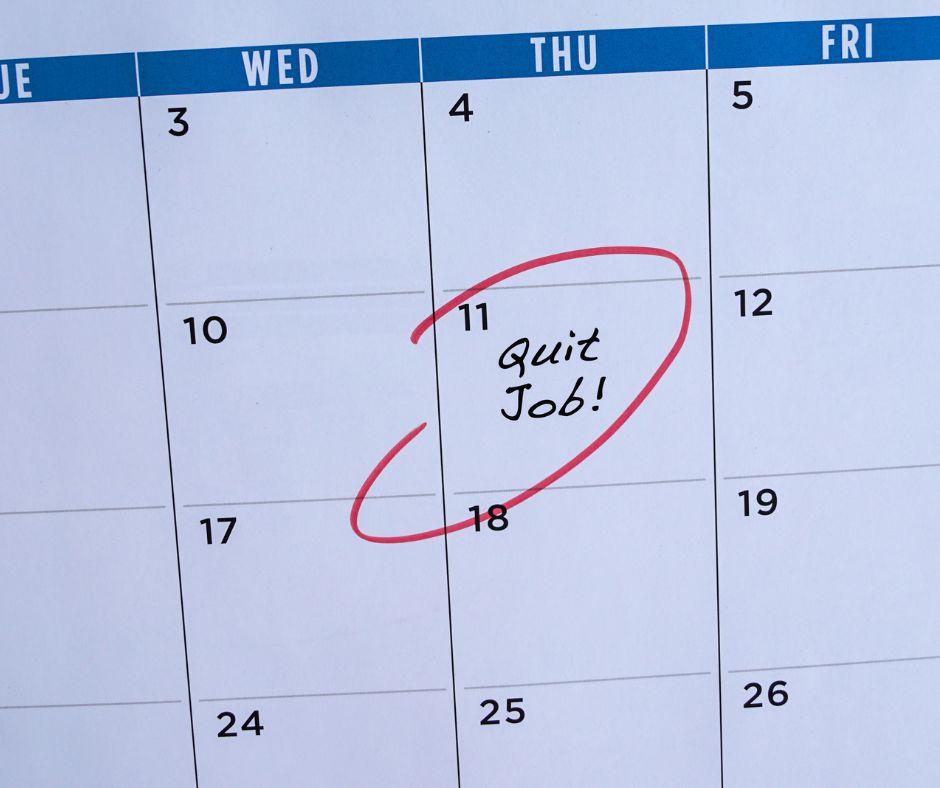It can be incredibly stressful when you reach a point where you feel like it’s time to quit your job. Whether due to a lack of growth opportunities, being undervalued, or simply feeling “stuck” in your current role, the decision to leave is never an easy one.
And this trend is only increasing — what has been dubbed ‘The Great Resignation of 2022’ is projected to be a year in which millions of employees will be quitting their jobs, with some estimates suggesting as many as 4.2 million people have said goodbye to their employer.
So what are the signs that it’s time for you to jump ship? Let’s explore seven common indicators before discussing what to do before quitting your job, how to quit professionally, and what our career coaching services can provide.
7 Signs That You Are Ready To Quit Your Job
Knowing when it’s time to move on can be difficult, and what works for one person may not apply to another. That being said, these are seven common indicators that you’re ready to quit your job:
1. You Want Room To Grow
Are you feeling limited in what you can learn or achieve in your current role? When you find yourself hitting the same glass ceiling over and over again, it might be time to look for opportunities with a company that allows you more room to grow.
2. You’ve Achieved All Your Goals
If what you had set out to accomplish in your current role has been achieved, then it might be time to move on and take the next step in your career.
3. You Are Experiencing Problems With A Superior Or Boss
Struggling with a supervisor or manager can be particularly stressful. Unresolved issues can lead to resentment and unhappiness that may eventually make it unbearable to remain in your current role.
4. You Look For Ways To Avoid Your Job
Do you find yourself endlessly procrastinating and avoiding what you need to do? If it has become a regular occurrence, then it could be an indicator that your role is not satisfying you anymore.
5. You Feel Undervalued
Do you feel like your skills and efforts are never acknowledged or appreciated? When the work you put into your job goes unnoticed or unappreciated, it can lead to feelings of resentment and unhappiness. Luckily, it doesn’t have to stay this way, and making a move could lead to a change in environment and greater recognition of what you bring to the table.
6. You Feel Exhausted, Burnout, Or Dread
Are you constantly feeling fatigued or dreading what lies ahead? Or are you feeling unmotivated and uninspired? If what used to be enthusiasm has been replaced by exhaustion, you may need a change. Burnout can be incredibly draining and if you’re feeling overwhelmed or exhausted, it could be a telltale sign that you need to move on.
7. You Notice The Company Or Industry Is Having Problems
Are the company’s financial conditions uncertain? Are there signs of trouble in its industry? When the writing’s on the wall, it’s often a sign that it’s time to move on and explore what else is out there.
What To Do Before Quitting?
If you’ve identified the signs that it could be time for you to move on, then what should you do before actually quitting your job? Here are four steps:
1. Talk To Your Supervisor
It’s always prudent to speak to your manager before taking the leap and quitting. If you’re feeling undervalued, exhausted, or just looking for a room to grow, then having an open conversation with your boss might help improve the situation and allow you to stay in your current role if it turns out to be the best option.
2. Identify Your Ideal Job
What are you looking for in your next job? What skills do you have that could benefit a new role? Taking the time to identify what type of job would make you happiest is key before heading off into the unknown. Research what jobs are out there that match what you’re looking for and what qualifications or experience you may need. Working with a professional career coach will help you pinpoint what ideal job matches your strengths, weaknesses, background, and preferences.
3. Get Your Resume In Order
To be ready for what’s to come, make sure that you have an up-to-date resume. You won’t know what kind of opportunities might arise, so being prepared is essential. Your resume should highlight what you’ve accomplished in your current role and what skills and abilities you can bring to a new one. Utilizing resume writing prompts can help you to create an impactful resume that will stand out from the rest.
Also, using a professional resume writing coach to conduct a resume critique of what you have prepared can improve what you’ve written and make your resume even more effective.
4. Save Money
No matter what step you take next, make sure to save enough money so that you have a cushion before starting something new. It will cover your living expenses while you find something that’s right for you. The transition period can be difficult, so having money saved up will help you through it.
How To Quit Your Job Professionally
No matter what the reason is for wanting to leave, it’s important to quit your job professionally. Here are five tips to help you do just that:
1. Don’t Burn Your Bridges
Remember that what you say and do now will reflect on how people view you, so be polite and professional when handing in your notice. It’s important to maintain a good relationship with people you have worked with, even if you’re frustrated or unhappy, as you never know what the future holds. These colleagues could become valuable contacts in the future so cultivating your connections is crucial.
2. Give A Two-Weeks Notice
When you hand in your resignation, it’s important to give your employer two weeks’ notice. This will allow them enough time to find a replacement and make sure the transition is smooth. Also, make sure to offer help when you’re leaving, as it will be greatly appreciated and make the parting easier.
3. Be Modest About Your Next Career Move
When discussing what you’re moving on to next, make sure to remain professional and modest. You should never be boastful or disparaging about your current workplace when talking about what you’re doing next. Plus, by maintaining a positive attitude, you can make the goodbye process much easier.
4. Tell Your Boss First
When quitting your job, it’s good practice to tell your boss first, before you talk about it with anyone else. This shows that you respect them and allows them to start preparing for what comes next. A few questions you can ask your boss include:
- what skills would they like to see in the person that replaces you
- what qualities do they think the ideal candidate should have
- what tips can they provide on what to do when quitting
5. Maintain A Positive Attitude
No matter how you feel about quitting your job, make sure to maintain a positive attitude when talking about it. Being negative could give people the wrong impression and might make it difficult for you to find opportunities in the future.
Our Career Coaching Services Are Designed
Finding the perfect job can be a daunting task and what’s even more intimidating is quitting your current one. That’s why our career coaching services are designed to help you make the transition easier and find what you’re looking for.
From helping you identify what type of job would be ideal, and creating an impactful resume, to what to say when quitting your job–our professionals are here to help. Get in touch today to start your journey toward finding what you’re looking for.




